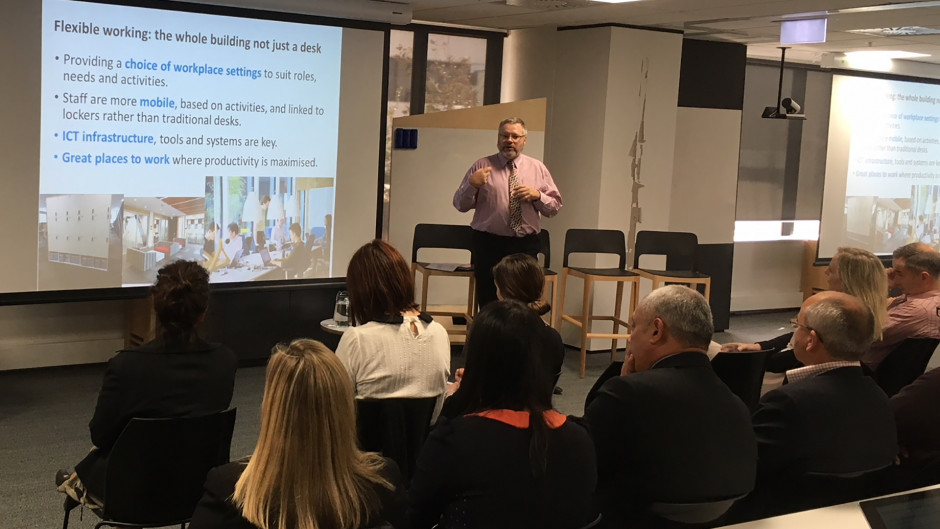Government agencies share flexible working insights
Over 100 government property professionals attended Government Property Group’s new ways of working knowledge sharing session this month. Representatives from the State Services Commission (SSC), Department of Internal Affairs (DIA) and Statistics New Zealand shared their experiences and gave advice on moving to flexible working environments.
At the forum held at DIA’s new Pipitea Street building, the speakers reflected on the demise of the traditional office following changes in demographics and technology. The importance of having leadership fully on board and data to back up your decisions were also highlighted.
“Workplace design is more than fixtures and fittings these days. It’s about culture and people and how we embrace more mobile ways of working,” says Peter Bollmann, Chief Advisor Property, Government Property Group (GPG).
Flexible working helped State Services Commission’s move to collaborative model
A vision to move the State Services Commission away from the ‘HR department of the Public Service’ to one of system leadership was behind the change to a fully agile working environment.
Rachel Bruce, Deputy Commissioner, Corporate Services, SSC says that it was this vision, followed by a new operating model, that led to them thinking about how the physical space could help achieve their organisational goals.
SSC now has a fully unassigned desk environment, even for the Head of State Services, which enables them to accommodate cross agency teams as and when required.
“We have come from a formal working environment which was inflexible and insular. We now have a welcoming and collaborative workspace that allows people to work in a way and in a place that best suits their activity at the time. We are completely open and it has revolutionised how we work,” says Rachel.
Regular communication was fundamental in DIA’s move to flexible working
DIA’s move to Pipitea Street, Wellington, meant adapting to a raft of changes for staff. These included rohe (neighbourhood zones), digital devices, personal lockers, unassigned desking and a choice of workplace settings.
Emily Redmond, Director - Change & Workplace, DIA says it was through their investment in change and communications that DIA made the most out of the move.
“We researched, we listened and we learned about what our people were concerned about and what they needed both in terms of spaces and tools to have a productive day at work, but also the support they needed to move to new ways of working. We then used that knowledge in campaigns that helped them prepare for the change, for example, a paper storage education campaign to allay concerns about where to store paper.”
Emily says they ensured staff had a lot of support during the first few weeks of the move - occupational therapists on hand, floor walkers who could deal with issues on the spot and IT support at their dedicated Techshop area.
Statistics New Zealand looks to data and research to inform their workplace strategy
Statistics New Zealand has had a bumpy ride implementing flexible working. The biggest hurdle was the destruction of their Wellington building following the Kaikoura earthquake.
While progress implementing a fully flexible working model is slower than they would like, it hasn’t stopped their desire to move towards better ways of working. They stay informed of the latest thinking by attending summits, studying international organisations and data-driven research.
Margaret Delany, Chief Financial Officer, Statistics NZ says keeping up with latest thinking is important. “Data is the new black and we need to attract the brightest,” she says.
“We want to create the best environment for our people to succeed - cultural, technological and physical. The physical environment must be an enabler for our strategy and the vision that we want to achieve.”
What’s next? A responsive work environment catering to future workers
Also at the event was Warren & Mahoney Principal, Neil Christopher, who commented that we’re moving towards a mobile workforce with more consultants and temporary employees.
“If the workplace stayed the same it won’t support the workforce of the future. We need fully agile workplaces for a fully agile workforce,” says Neil.
However we adapt, it’s clear that the future of government property is changing and it will take leadership and commitment from agencies to seize the opportunities it brings.
